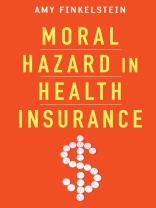Moral hazard—the tendency to change behavior when the cost of that behavior will be borne by others—is a particularly tricky question when considering health care. Kenneth J. Arrow’s seminal 1963 paper on this topic (included in this volume) was one of the first to explore the implication of moral hazard for health care, and Amy Finkelstein—recognized as one of the world’s foremost experts on the topic—here examines this issue in the context of contemporary American health care policy.
Drawing on research from both the original RAND Health Insurance Experiment and her own research, including a 2008 Health Insurance Experiment in Oregon, Finkelstein presents compelling evidence that health insurance does indeed affect medical spending and encourages policy solutions that acknowledge and account for this. The volume also features commentaries and insights from other renowned economists, including an introduction by Joseph P. Newhouse that provides context for the discussion, a commentary from Jonathan Gruber that considers provider-side moral hazard, and reflections from Joseph E. Stiglitz and Kenneth J. Arrow.
Tabla de materias
Foreword, by Joseph E. Stiglitz
Introduction, by Joseph P. Newhouse
Moral Hazard in Health Insurance: Developments Since Arrow (1963), by Amy Finkelstein
Commentary, by Jonathan Gruber
Commentary, by Kenneth J. Arrow
Commentary, by Joseph E. Stiglitz
Discussion
Arrow (1963): Uncertainty and the Welfare Economics of Medical Care, by Kenneth J. Arrow
Notes on Contributors
Index
Sobre el autor
Amy Finkelstein is the Ford Professor of Economics at the Massachusetts Institute of Technology, codirector of JPAL North America, and codirector of the Public Economics Program at the National Bureau of Economic Research. She is a recipient of the John Bates Clark medal from the American Economic Association, the ASHEcon Medal from the American Society of Health Economics, and the Elaine Bennett Research Prize, awarded by the Committee on the Status of Women in the Economics Profession.












